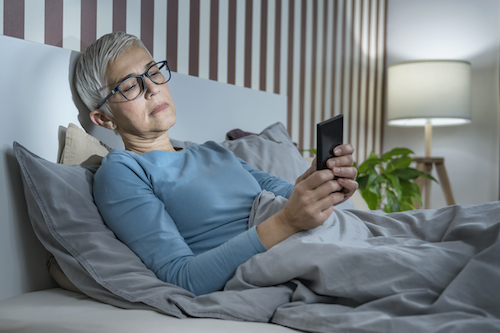
Can compounds in cannabis like CBD combat symptoms of exposure to blue light? Photo credit: Envato.
Screens dominate our lives. From social media to emails to plain communication, everything is available through one. While electronic devices are a crucial aspect of anyone’s day, the blue light emitted from cell phones, tablets, computers and even fluorescent lights can not only damage one’s eyes and skin, but it can also disrupt sleep patterns.
Blue Light and Sleep
Blue light is a source of light that emanates from screens and devices. Harvard researchers find that excessive amounts of it can reduce production of melatonin, a hormone associated with sleep cycles. Furthermore, they say that more exposure to blue light could lead to a disruption in sleep cycles.
Consequently, Harvard Health recommends limiting screen time two to three hours before bedtime. Doing this can improve and regulate sleep rhythms, they say. One can also reduce their exposure to this type of light by using red dim lights or sunlight, according to Harvard Health. Red dim lights at night are less likely to suppress melatonin.
While reducing exposure is best, it’s not entirely avoidable. As such, many consumers use CBD and THC to help control circadian rhythms, and promote sleep.
In fact, recent research by The University of Western Australia’s (UWA) Centre for Sleep Science finds that cannabis reduces symptoms of chronic insomnia and stress. In the study, patients who randomly took cannabis saw up to 36% reduction in sleeplessness.
For those seeking relief from irregular sleep patterns, Healthline suggests looking towards strains of cannabis that contain more THC than CBD. Examples include Blue Dream, Wedding Cake, Sour Diesel and more.
Blue Light and Skin
While exposure to blue light can affect sleep cycles, this type of light is shown to lead to alterations in skin cells, according to WebMD.
More specifically, research shows that exposure to blue light from screens and devices can affect skin cell growth and cell shrinkage, according to WebMD. Effects such as pigmentation, swelling, and redness can be seen after blue light usage.
When trying to combat these effects, Medical News Today states that CBD oil may be beneficial. For example, research shows that certain cannabinoids, particularly CBD, are effective at relieving inflammation and redness, and soothing skin.
For this reason, there are a variety of skin care products on the market that include CBD. From sunscreen to Blue Light Moisturizer, cannabis’ properties may help combat a variety of environmental stressors.


Leave a Reply